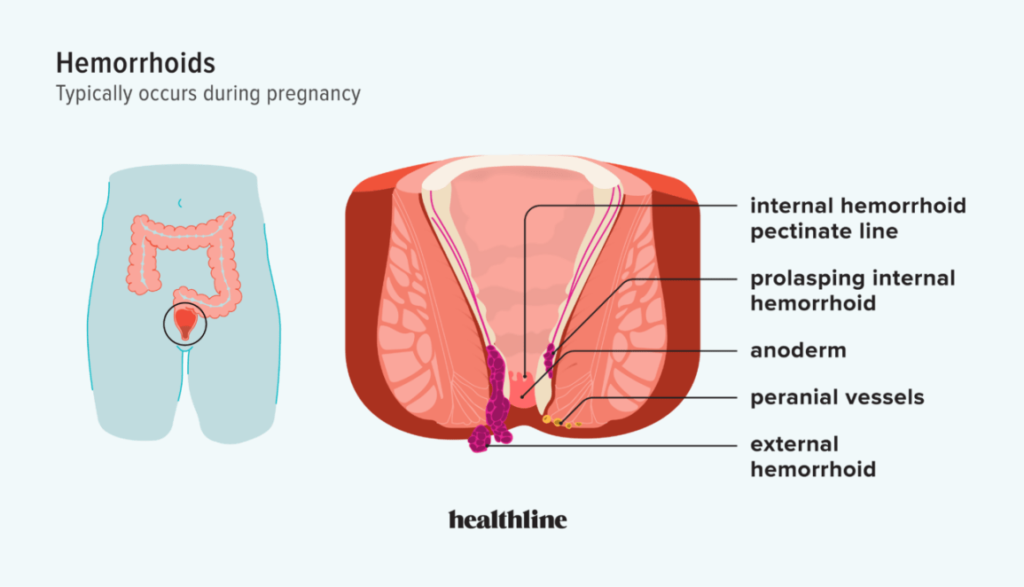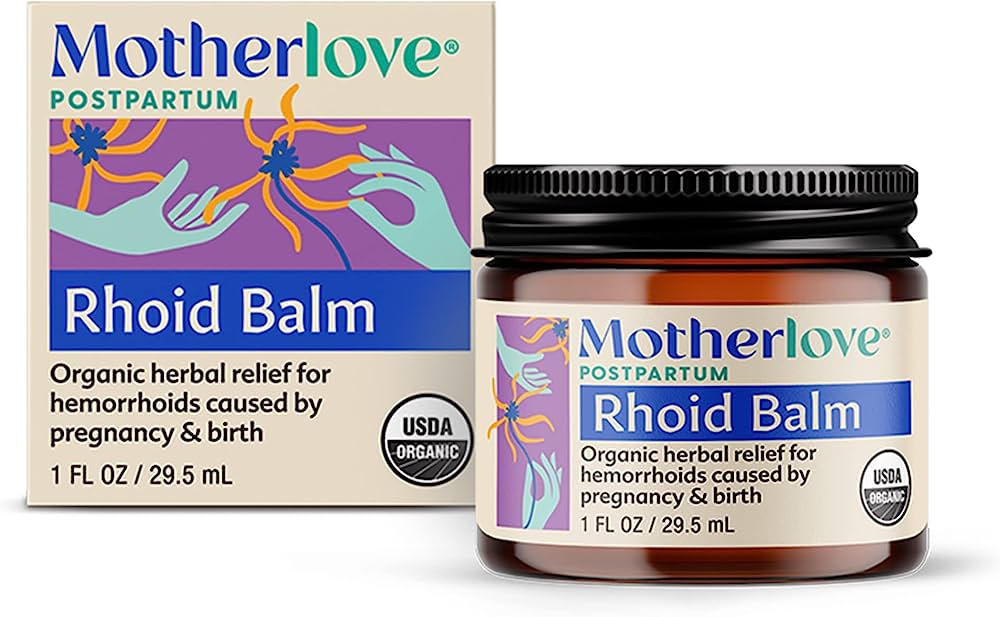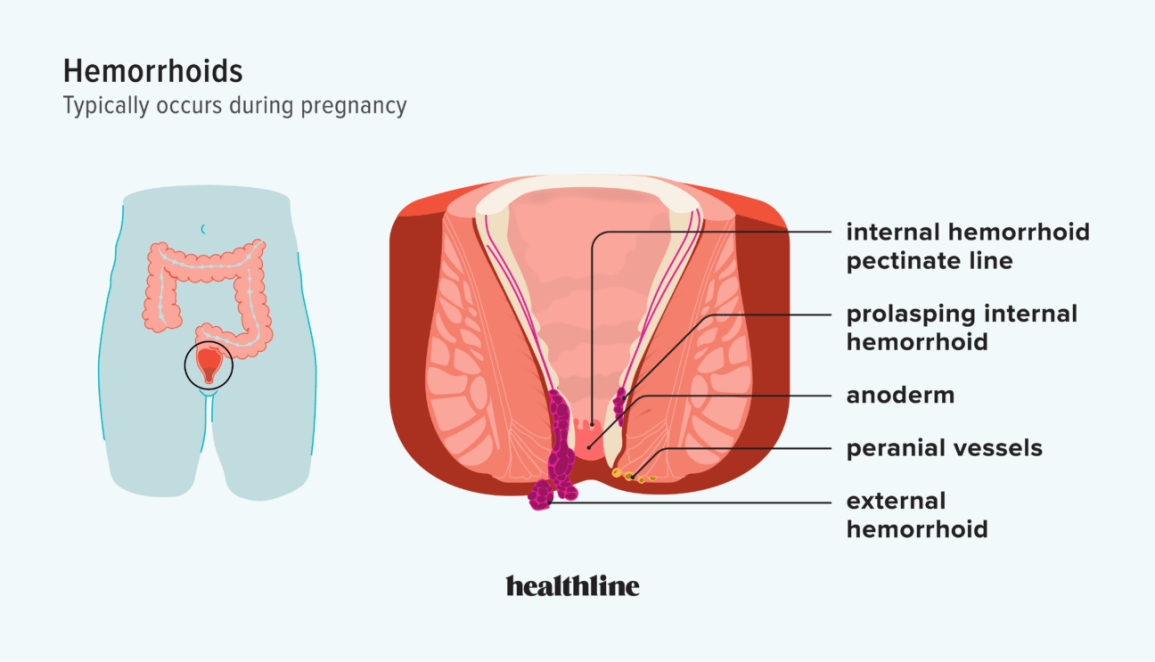As an Amazon Associate I earn from qualifying purchases.
Understanding Hemorrhoids During Pregnancy
Hemorrhoids might not be a topic you’d typically share with your friends and family, but they’re certainly a common issue amongst pregnant women, making it all the more important for you to know about them. In this section, we’ll delve into the causes and symptoms of hemorrhoids during pregnancy while also discussing the prevalence of these pesky physical inconveniences and whether they pose any threat to your baby. So let’s get started, shall we?
Causes of Hemorrhoids in Pregnant Women
Hemorrhoids, the swollen veins in the rectum and anus, are often experienced during pregnancy and can be quite uncomfortable. To better understand why exactly we’re more susceptible to hemorrhoids while carrying our unborn little ones, we must first examine the changes taking place within our bodies during this time.
For one, the increase in progesterone levels can cause relaxation of blood vessel walls, making them more vulnerable to swelling. On top of that, the growing uterus puts pressure on the pelvic veins and the rectum, contributing to the formation of hemorrhoids. Furthermore, constipation – a prevalent issue for many pregnant women – might cause you to strain while passing stool, thereby aggravating hemorrhoids.
Symptoms of Hemorrhoids in Pregnancy
Hemorrhoids can be a real pain in the you-know-what, and it’s high time we learned what sort of symptoms we should be on the lookout for. Here are some common signs that you might be experiencing hemorrhoids during your pregnancy:
- Swelling or a lump near the anus
- Pain, itchiness, or discomfort around the anal area
- Bright red blood when you pass a stool
- Leakage of feces or mucus
Remember that if you experience any of these symptoms, it’s essential to consult a healthcare professional for appropriate diagnosis and guidance on safe treatment options.
Prevalence of Hemorrhoids During Pregnancy
Now that we’ve discussed the causes and symptoms of hemorrhoids, let’s touch on just how common these nuisances are among pregnant women. Studies suggest that about 25-35% of expecting mothers experience hemorrhoids, with most cases occurring during the third trimester – when the increased pressure on the rectal veins is at its peak. So if you find yourself suffering from hemorrhoids during pregnancy, you’re certainly not alone in this struggle!
Can Hemorrhoids Affect the Baby?
Of course, it’s natural to worry about any health issue affecting our developing little ones, so let’s address the question weighing on your mind: can hemorrhoids harm your baby? In short, no. Hemorrhoids are unlikely to impact your baby or the pregnancy itself. However, they can make the already challenging process of pregnancy and childbirth more uncomfortable for you.
With this newfound knowledge about hemorrhoids during pregnancy, you can now take control, understanding the causes and symptoms while also knowing that this common issue won’t harm your precious little one. Consult your healthcare provider for safe treatment and prevention options to make your pregnancy journey as comfortable and hemorrhoid-free as possible!

Safe Hemorrhoid Treatments for Pregnant Women
Over-the-counter Treatments
While you’re pregnant, it’s natural to be concerned about the safety of any medications you might use. Thankfully, some over-the-counter treatments for hemorrhoids are safe for expecting moms. Just remember to always check with your healthcare provider before starting any new treatment.
Topical Treatments
Some topical ointments and creams can help to relieve the swelling and discomfort associated with hemorrhoids. Look for products containing witch hazel or hydrocortisone, as these ingredients are known to be safe during pregnancy. But again, don’t forget to consult your doctor before using any new creams or ointments.
Oral Medications
When it comes to oral medications, acetaminophen is the go-to pain reliever for pregnant women. It can help to reduce inflammation and discomfort caused by hemorrhoids. However, avoid taking other pain relievers, such as ibuprofen or aspirin, without consulting your healthcare provider, as these can potentially harm your developing baby.
Sitz Baths
A sitz bath is a shallow, warm water bath that can help soothe the discomfort from hemorrhoids. To take a sitz bath, fill your bathtub with just a few inches of warm water, and relax for about 15 to 20 minutes. Adding Epsom salt to the water can provide additional relief. Do this a couple times a day, especially after a bowel movement, to help alleviate the pain and irritation.
Cold and Warm Compresses
Using cold and warm compresses can help to alleviate the inflammation and discomfort caused by hemorrhoids. Apply a cold compress, such as a bag of ice or frozen peas, to the affected area for about 15 minutes. Then, follow up with a warm compress for an additional 15 minutes. This combination can help to improve blood flow and reduce swelling and pain.
Epsom Salt Baths
An Epsom salt bath can help to soothe irritated skin and reduce the inflammation caused by hemorrhoids. All you need to do is add half a cup of Epsom salt to a warm bath and soak for around 20 minutes. This can provide you with immediate relief from the pain and itching that often accompanies hemorrhoids.
Pregnancy-Safe Hemorrhoid Creams
When searching for a pregnancy-safe hemorrhoid cream, you can look for products containing witch hazel or hydrocortisone. These ingredients are safe for use during pregnancy and can provide relief from the pain and itching caused by hemorrhoids. As always, consult your healthcare provider before using any new products.
Herbal Remedies
Some herbal remedies can help to alleviate the symptoms of hemorrhoids safely during pregnancy. Horse chestnut, butcher’s broom, and bioflavonoids like diosmin and hesperidin are known to help with circulation and inflammation. However, do your research and check with your healthcare provider before using any herbal remedies, as some might not be suitable for use during pregnancy.
When to Consult Your Healthcare Provider
If you’re experiencing severe pain, bleeding, or worsening symptoms despite trying the remedies mentioned above, it’s essential to consult your healthcare provider. They can assess your situation and provide you with personalized advice on how to treat your hemorrhoids during pregnancy. Remember, always consult your doctor before starting any new treatment or remedy, as not all products might be suitable for use during pregnancy.
Preventing Hemorrhoids During Pregnancy
Pregnancy can be a beautiful and joyful journey, but let’s face it – it also comes with its fair share of discomforts. One such discomfort is the development of hemorrhoids during pregnancy. Luckily, there are measures you can take to prevent and safely treat hemorrhoids while you’re expecting. Let’s dive into some safe hemorrhoid treatments for pregnant women.
Constipation Prevention and Management
Constipation can worsen hemorrhoids, as straining during bowel movements can put pressure on the veins in your rectum. Preventing constipation is crucial for managing hemorrhoids during pregnancy. Here are some tips to manage constipation:
- Drink plenty of water and stay hydrated.
- Include fiber-rich foods in your diet, such as fruits, vegetables, whole grains, and legumes.
- Avoid excessive intake of caffeine and processed foods.
- If necessary, discuss with your healthcare provider about using over-the-counter stool softeners or fiber supplements that are safe for use during pregnancy.
Diet and Nutrition
A balanced diet is not only vital for your baby’s growth but can also help prevent hemorrhoids. A diet high in fiber can promote healthy bowel movements and reduce the risk of constipation. Be sure to include plenty of fruits and vegetables, whole grains, and lean proteins in your diet. Additionally, don’t forget to drink enough water to support healthy digestion.
Exercise and Movement
Gentle exercise like prenatal yoga, walking, or swimming can improve blood circulation and help prevent hemorrhoids during pregnancy. Aim for at least 30 minutes of light physical activity most days of the week, unless your healthcare provider advises otherwise. Remember to listen to your body and avoid overexerting yourself – a light sweat will suffice!
Proper Rest and Sleep Positions
Getting enough rest during pregnancy is essential, but your sleep position can also impact your chances of developing hemorrhoids. Sleeping on your left side can reduce pressure on your veins, which may lower your risk for hemorrhoids. You can also try placing a pillow between your knees while sleeping for added comfort.
Avoid Prolonged Sitting or Standing
Maintaining the same position for extended periods puts pressure on the veins in and around your rectum, increasing your chances of developing hemorrhoids. Make a conscious effort to change positions frequently – whether at work or home. Set a timer to remind yourself to get up and walk around every hour or so.
Proper Posture
Maintaining proper posture during pregnancy can help prevent hemorrhoids by minimizing pressure on your pelvic veins. Practice good sitting posture by keeping both feet flat on the floor and sitting with your back straight. Keep your weight evenly distributed when standing, and feel free to use a footstool for added support if needed.
By following these preventative measures, you’ll be well on your way to a more comfortable pregnancy. Remember, it’s always best to consult your healthcare provider if you’re concerned about hemorrhoids, or if you’re experiencing pain or discomfort. You’ve got this, mama!

Postpartum Hemorrhoid Care
Understanding Postpartum Hemorrhoids
After giving birth, you might find yourself dealing with a new set of challenges, including postpartum hemorrhoids. These painful, swollen veins around the anus and lower rectum can be a result of the increased pressure on the pelvic area during pregnancy and childbirth. So, if you’re feeling a bit sore down there, don’t worry – you’re not alone, and there are ways to manage it!
How to Treat Postpartum Hemorrhoids
Thankfully, there are several methods to help alleviate the discomfort caused by hemorrhoids:
-
Sitz baths: Soak your bottom in warm water for 10-15 minutes, 2-3 times a day. This can help soothe the pain and promote healing. You can find a sitz bath at your local pharmacy or medical supply store.
-
Over-the-counter creams: Hemorrhoid creams, ointments, or suppositories containing hydrocortisone can work wonders in reducing pain and swelling. However, it’s best to consult your healthcare provider before using these products to make sure they’re safe during breastfeeding.
-
Cold packs: Applying an ice pack or cold compress to the affected area for 20 minutes several times a day can help reduce inflammation and provide temporary relief.
-
Keep it clean: Keep the area clean by gently wiping with unscented baby wipes or a soft, moist cloth after each bowel movement. Avoid using dry toilet paper, as it may cause further irritation.
Postpartum Hemorrhoid Prevention
To prevent hemorrhoids from returning while you’re still healing, try these helpful tips:
-
Stay hydrated: Drinking plenty of water can help soften your stools, making them easier to pass.
-
Eat high-fiber foods: Include fruits, vegetables, and whole grains in your diet to help avoid constipation and decrease your risk of hemorrhoids.
-
Don’t strain: Take your time in the bathroom and avoid straining during bowel movements. Straining puts increased pressure on the veins in the rectum, which may cause or worsen hemorrhoids.
-
Exercise: Light exercise, such as walking, can help improve your circulation and promote regular bowel movements. Check with your healthcare provider before starting any exercise program postpartum.
-
Avoid long periods of sitting: Sitting for extended periods can put pressure on your rectum, increasing the risk of hemorrhoids. Taking breaks to walk or stretch can provide some relief.
Postpartum Hemorrhoid Recovery
It’s essential to remember that healing from childbirth, including postpartum hemorrhoids, takes time. Follow your healthcare provider’s advice and don’t rush your recovery. Hemorrhoids usually get better within a few weeks, but if you’re still experiencing severe pain or bleeding, don’t hesitate to contact your healthcare provider. You deserve to feel comfortable and healthy while taking care of your new bundle of joy.
Frequently Asked Questions
Can I Use Over-the-counter Hemorrhoid Treatments During Pregnancy?
Well, you might be tempted to reach for over-the-counter (OTC) hemorrhoid treatments to soothe your discomfort, but it’s best to exercise caution. Some OTC treatments might not be safe for pregnant women, while others could be perfectly fine. Always consult your healthcare provider before using any medication during pregnancy, including hemorrhoid treatments. They’ll help you figure out which products are safe and suitable for you.
Is it Safe to Get a Hemorrhoidectomy While Pregnant?
Generally speaking, having a hemorrhoidectomy (surgical removal of hemorrhoids) during pregnancy isn’t recommended. Surgery carries risks, like infection and bleeding, which you’d rather avoid while you’re expecting. Plus, being pregnant can make surgery more complicated. So, if at all possible, it’s best to wait until after you’ve had your baby to undergo a hemorrhoidectomy.
That said, if your hemorrhoids are causing severe pain, bleeding, or other complications, your healthcare provider might consider surgery. In such cases, it’s essential to weigh the potential benefits against the risks carefully.
How Can I Reduce the Pain of Hemorrhoids During Pregnancy?
Dealing with hemorrhoids during pregnancy can be a real pain in the you-know-what. Fortunately, there are several safe, simple strategies to ease the discomfort:
- Cold compresses: Applying a cold pack to the affected area can help alleviate swelling and pain.
- Warm baths: Soaking in a warm tub (just remember not to make it too hot) can help soothe and relax the affected area. Add some Epsom salt for an extra touch of relief.
- Witch hazel pads: Witch hazel is a natural astringent that can help reduce swelling and soothe pain. You can find pre-moistened witch hazel pads at your local drugstore or make your own by soaking a cotton pad in witch hazel.
- Over-the-counter pain relievers: Some pain relievers, like acetaminophen, are considered safe for pregnant women. But, always talk to your healthcare provider before taking any medication during pregnancy.
Does Pregnancy Always Cause Hemorrhoids?
Not necessarily! While it’s true that pregnancy can increase your chances of developing hemorrhoids, not all pregnant women get them. Factors like constipation, straining during bowel movements, and increased pressure on pelvic blood vessels can contribute to hemorrhoids during pregnancy, but not every expecting mama will experience these issues.
What Can I Do During Pregnancy to Prevent Hemorrhoids?
You might be wondering if there’s anything you can do to avoid hemorrhoids during pregnancy altogether. While there’s no surefire way to prevent them, these lifestyle changes can help reduce your risk:
- Stay regular: Preventing constipation can help reduce your risk of hemorrhoids. Make sure you’re eating a balanced diet with plenty of fiber, drinking plenty of water, and getting regular exercise.
- Avoid straining: When you’re using the restroom, don’t strain or hold your breath during bowel movements. This can put added pressure on the blood vessels in your pelvic area, increasing your risk of hemorrhoids.
- Don’t wait: When you feel the urge to go, don’t put it off for too long. Delaying bowel movements can make your stool harder and more difficult to pass, increasing your risk of constipation and hemorrhoids.
- Elevate your feet: Using a footstool or even a couple of books to elevate your feet while sitting on the toilet can help reduce straining and pressure on the blood vessels in your pelvic area.
Can Hemorrhoids Cause Complications During Delivery?
Hemorrhoids aren’t usually a cause for concern during delivery. Most of the time, they won’t interfere with your ability to give birth. In some cases, the strain of pushing during labor can temporarily worsen hemorrhoids, but they should start to improve pretty quickly after you’ve had your baby. If you’re worried about hemorrhoids causing complications during delivery, be sure to talk with your healthcare provider. They’ll be able to guide you and address any concerns you might have.
Amazon and the Amazon logo are trademarks of Amazon.com, Inc, or its affiliates.
